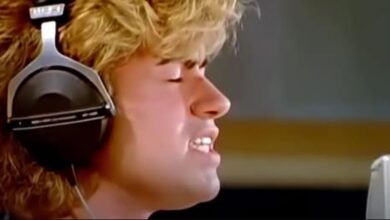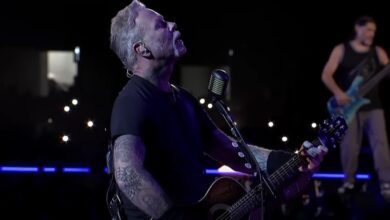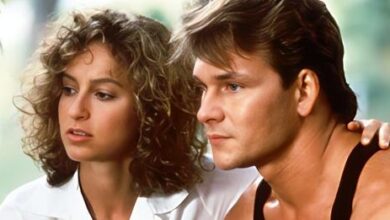Listen – 67 years old and never get tired of listening to this
“Radar Love” by Golden Earring, released in 1973, is a timeless rock anthem that has captivated audiences for decades with its driving rhythm, storytelling, and atmospheric feel. Written by band members George Kooymans and Barry Hay, the song became the Dutch rock band’s biggest international hit, marking a pinnacle in their career. It reached No. 13 on the U.S. Billboard Hot 100 and became a classic road song, synonymous with long drives and open highways. Its blend of rock, funk, and jazz elements contributed to its status as a quintessential track of the 1970s.
The song’s lyrics tell the story of a man driving late at night, communicating telepathically with his lover through what he describes as “radar love.” It’s a metaphor for a deep, almost supernatural connection between two people, where words are unnecessary. The driver feels an irresistible pull to reunite with his lover, guided by this invisible force as he speeds down the road. This concept of love transcending space and time, combined with the imagery of a late-night journey, gives the song a sense of mystery and urgency.
Musically, “Radar Love” is built around a relentless groove that drives the song forward, reflecting the feeling of being on the move. The steady, pulsing bass line by Rinus Gerritsen and Cesar Zuiderwijk’s energetic drumming are at the core of the song’s rhythm, imitating the feeling of tires rolling down the highway. Kooymans’ guitar work is a perfect complement, with its sharp, bluesy riffs and memorable solo adding layers of excitement and tension to the track.
One of the standout features of “Radar Love” is its extended instrumental section, which includes a breakdown and a powerful guitar solo. This mid-song jam, punctuated by a brass section and layered percussion, showcases the band’s musicianship and versatility. The instrumental passage adds to the song’s narrative, representing the rising intensity of the driver’s journey, as the music swells and recedes like waves on the road.
The song’s production and arrangement also played a role in its success. Unlike many of their contemporaries, Golden Earring embraced a full, dynamic sound with intricate layering, making “Radar Love” more than just a straightforward rock song. The inclusion of brass elements and the meticulous attention to the sonic texture gave it a richness that helped it stand out on both rock radio and within the broader landscape of 1970s rock music.
Lyrically, Barry Hay’s storytelling shines, creating vivid images of a driver’s experience: “The radio’s playing some forgotten song, Brenda Lee’s ‘Coming on Strong’…” Lines like these, combined with the motif of a man racing through the night guided by an unseen connection, evoke a cinematic quality that has resonated with listeners over the years. The song’s themes of freedom, love, and the thrill of the open road have made it a lasting anthem for generations of rock fans.
“Radar Love” became a significant part of the band’s live performances, often serving as the high point of their concerts. The song’s extended jam sections were ripe for live improvisation, allowing the band to stretch it out and play with its dynamics. Over the years, it has become a staple at classic rock festivals, and it continues to be a fan favorite whenever the band or cover artists perform it. The song’s ability to evoke the spirit of the open road and adventure makes it a timeless piece of rock history.
The success of “Radar Love” was not just limited to Europe and the U.S. It became a global hit, helping Golden Earring cement their place in rock music history. The band, formed in 1961 in The Hague, had been successful in the Netherlands for over a decade before this international breakthrough. The song’s success opened doors for the band to tour extensively, including their first U.S. tour, where they performed alongside major acts of the era, like Led Zeppelin and Santana.
Over the years, “Radar Love” has been covered by numerous artists across different genres, including U2, Def Leppard, and Ministry, further solidifying its status as a rock classic. Its enduring appeal lies in its ability to capture the essence of the road trip experience — the freedom, the danger, and the exhilaration of being behind the wheel, heading towards something or someone with unstoppable momentum. The song’s narrative and musical structure have allowed it to remain relevant even decades after its initial release.
In the broader context of rock music, “Radar Love” is often seen as one of the definitive driving songs, alongside tracks like Steppenwolf’s “Born to Be Wild” and The Allman Brothers’ “Midnight Rider.” Its powerful beat, combined with its storytelling lyrics, creates a sense of motion and anticipation that resonates with anyone who has ever felt the allure of the open road. The song’s legacy has been cemented not only in rock history but also in pop culture, as it continues to appear in films, TV shows, and commercials, evoking the timeless appeal of travel and connection.
Ultimately, “Radar Love” stands as Golden Earring’s magnum opus, a song that combines expert musicianship with universal themes. Its fusion of rock, funk, and jazz elements, along with its compelling narrative of love and longing, have made it a song that transcends time and place. Whether heard on a long road trip or in a concert hall, it continues to captivate listeners with its raw energy, driving rhythm, and timeless message.





